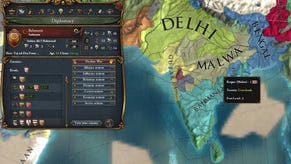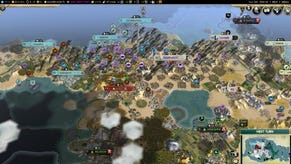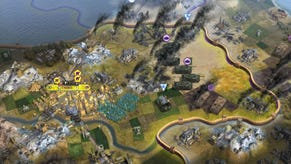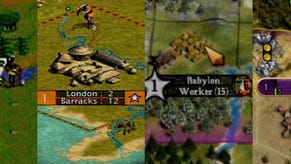Sid Meier's Civilization V
Hex and the city state.
Similarly, when one of your cities screams for a certain luxury, say ivory, then your eyes will be anxiously scanning the desert or tundra your people laughably call home, before inevitably eyeing up the Romans next door with their green fields and plentiful elephants.
What is increasingly looking like Civ V's triumph, then, is rendering its less glamorous constituent parts interesting, fun and comprehensible. Another example is the constant worry of the research and institution of a blanket society variant (Feudalism! Nationalism! Communism!). This has been given extra texture, depth and control through a social policy screen that lets you sit in multiple camps (where applicable) as well as unlock various new civil branches within each structure of rule.
As for warfare, with a new emphasis on ranged combat, the introduction of hexagonal movement and the fact that no two military units can now stand on the same tile, there's a real feeling of military tactics that enters proceedings. Combat is suddenly like a board game, with the protection of your game pieces just as vital as the damage they deal. Cities now have firepower of their own and can only keep one military unit with their walls, which means that general combat has gently been edged away from constant urban bombardment and out into the open hills and dales of your lands.
As for an Iron Age warrior being buried beneath a pile of units and waking up in the manner of California Man, worriedly blinking in the light of nuclear explosions and aeroplanes buzzing overhead... The idiots among us can't let that happen now, either.
In fact, this move away from tiled-up unit-spam, the overall reduced numbers of military units and (more importantly) the way that the game underlines the way units develop through XP-gathering and consequent upgrades, makes you an awful lot more aware of just what kinds of firepower your Civ is brandishing.
And as for the old complexities of piling your little chaps into boats and setting them off across a few tiles of water for a jolly boy's holiday beating up Roman scum, at a certain point of maritime tech, discovery units develop the ability to travel short distances in self-created boats. The days of countless turns in which you were nothing but a glorified ferry operator seem to have been partly erased.
If there's something within Civ V that I'm yet to be convinced by then it's City States: independent, one-city power blocks that are there to be allied with or trampled underfoot. On one hand, they provide an excellent way of expanding early on without the need to build Settlers (an alternative being to establish them as puppet regimes) but to an extent they also seem to get in the way of the traditional argy-bargy with the civilisations that are your direct competitors.
It's more fun to start research pacts, secrecy pacts and "why don't you give me the contents of your Treasury" pacts with the big boys than piddly old Warsaw. Although, as is the way with Civilization, if you don't want Warsaw and his chums in your game then they be turned off before the game begins.
Ultimately - with a UI that's frankly astounding, its polite hand-holding tutorials and event reminders somehow never becoming intrusive - there's little doubt that Civ V is onto something of a winner. The framework of classic Civ has been deconstructed, and its dustiest and most misunderstood parts have been ushered into the foreground, reappearing with a gleam, like the shiny C3PO when he throws his arms in the air at the end of Star Wars.
Established hacks will miss the religion, espionage and suchlike, and those features, surely, will be waiting in the wings as expansion packs. As for being able to name your city after how cool you are (or how cool you intend to be), I'm hoping this is an issue that can be dealt with before the September release, or at the very least in a post-release patch. WillisCool shall be triumphant once more. It has been written.
Sid Meier's Civilization V is due out for PC in September.








